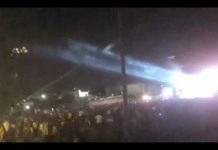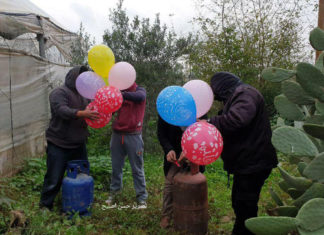The announcement that Israel would deploy its first Iron Dome anti-missile system near the southern city of Be’er Sheva has outraged both Jewish and Bedouin Negev residents on Sunday, who criticized the government over its apparent protection of larger cities, while neglecting smaller communities.
Palestinian militants have fired dozens of rockets at Israel over the last week, prompting Israeli air strikes against targeted areas in the Gaza Strip. The renewed hostilities have fed concerns of another large-scale Israeli military operation.
On Sunday, the IDF said it would deploy the first Iron Dome anti-rocket system in southern Israel for the first time, saying the first to enjoy the system’s defense would be Be’er Sheva – the Negev’s most populous city.
The announcement came as a special meeting of the Knesset’s Foreign Affairs and Defense Committee was taking place in Be’er Sheva to discuss Israel’s efforts to defend the regions within range of Gaza rockets from further attacks.
Speaking on Sunday, Sderot mayor David Buskila severely criticized the decision to place the first Iron Dome system near Be’er Sheva, saying the decision was made in order to “shut everyone up. We all need it, but there aren’t enough systems available.”
“We have been victims for years. The IDF did not initiate Operation Cast Lead because of what was happening in Sderot and the communities but because of Be’er Sheva and Ashdod.”
Appealing to Be’er Sheva mayor Rubik Danilovich, the Sderot mayor said: “Don’t get too excited over the system they deployed near your city, I’m not sure it’s yours, it has wheels.”
Also commenting on the recent defensive measures, the mayor of the Bedouin town of Rahat Faiz Abu Sahiban bemoaned what he considered the abandonment of Israel’s Bedouin citizens in the face of Gaza fire, saying: “We are within the rockets’ range, closer in fact than Be’er Sheva.”
“No one invited me to the Foreign Affairs and Defense Committee meeting, nor was any Bedouin council head invited. I can only assume that this is a case of first-class discrimination and that the state is abandoning its Bedouin citizens,” Abu Sahiban said.
In response to what he considered to be state discrimination, the Rahat mayor vowed “not cooperate with the security establishment regarding the Home Commands’ directives.”
“I am outraged. I cannot understand how the head of the neighboring Lehavim council was invited an I wasn’t. I guess someone [in government] doesn’t care about Rahat. The rocket leaving Gaza is blind, it doesn’t know Arabs from Jews,” Abu Sahiban added.
In response to the claims presented by the Rahat mayor, the Knesset’s Foreign Affairs and Defense Committee issued a statement saying that the decision to hold the meeting was taken on Friday, and as a result of the lack of time “some relevant officials that should have been invited were nevertheless not invited.”
“That decision was an innocent mistake and was not an attempt to ignore this or that sector,” the statement read, adding that “several Jewish council heads were forgotten as well.”
“During the month of June a committee meeting will take place concerning emergency procedures which will be attended by all of the council heads in the country, including the Arab ones,” the statement said.
The components of the Iron Dome battery – which include launchers, a radar, the control system and monitor – were each placed a few kilometers from one another on desert terrain, as soldiers from the Israel Air Force air defense unit began configuring the system.
The IDF said the system should begin operating on Sunday afternoon, but has described the step as an “operational experiment,” saying the deployment of the Iron Dome and beginning its actual use will take some time.








